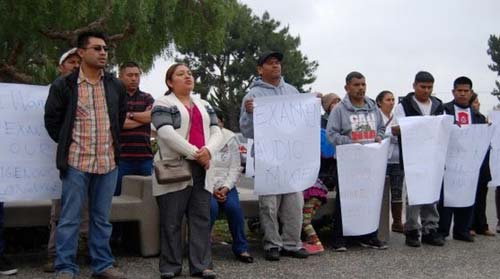What employers MUST ponder before partaking in a staff ‘dieting for dollars’ program
TIM, Living Well, Merilee Kern, MBA
Since research has proven financial incentives and penalties to be highly effective in motivating weight-loss, there’s been an uptick in the number of organizations looking to capitalize on the cash-driven dieting idea and add their spin to an already crowded marketplace. The trick for employers seeking to bolster to give staffers an extra source of motivation to shed a few (or more) pounds, is determining the legitimacy of the organization in question. Choosing poorly could make the entire endeavor a bust or, worse, could land you in the heart of a scam.
According to the experts at HealthyWage—an industry-leading purveyor of corporate and team-based weight-loss challenges, employers should consider the following when looking to start a group-wide pay-for-pounds program:
- Prize funding
Where does the prize money come from? Is it guaranteed and, if so, how is it guaranteed? Know how you’re being paid for your success, and the safeguards that have been put into place to guarantee payout when the time comes. Also important is to know when payments will be made and the options for receiving those prizes, noting any fees involved or possible causes for delay. If the organization you’re dealing with does not have quick and upfront answers to these questions, it may be wise to move along. - Tools & Accountability
A large part of weight-loss success, with or without financial incentives, are the tools and accountability measures provided along the way. What tools, resources and overall support mechanisms does the organization or program offer to help you be successful? An initiative lacking in resources and/or any sort of accountability program may not have your weight-loss best interest in mind. Don’t discount what is (or is not) provided for your benefit—to ultimately facilitate your success—during the diet process. - Verified weigh-ins
A process for verifying weight both at the start and finish of a challenge-driven program, whether through a third-party or some other clearly defined protocol, is essential for eliminating fraudulent participants and ensuring payout when it’s is due. If there is no verification or audit process in place, or the established process can be easily undermined, the program and its reward are most likely too good to be true. - Better Business Bureau
It’s prudent to always check with the Better Business Bureau before doing business with any online company (or most any other company, for that matter). Check the rating—nothing less than an “A” should be acceptable. If there are complaints, make sure they’ve been resolved and read through the corresponding information that the company has provided in response to any issue before moving forward. - Credible testimonials and reviews
Both corporate partner and actual participant testimonials will speak volumes when it comes to the legitimacy of the organization you are dealing with. Media coverage should also be considered. What media outlets are covering the organization, and are any high profile? And, what exactly do they have to say about the programs being offered? Look for testimonials from Fortune 500 companies, major national magazines, top-tier newspapers and major network TV coverage. - Experts
Who is behind the company and the programs offered? While most organizations will tout the body of research highlighting the effectiveness of employing financial incentives and penalties for inducing weight-loss, dig a little deeper to understand the background of those designing and contributing to the actual weight-loss programming. Industry experts, physicians and researchers should be present, either on staff or in advisory roles. - Third party products
Should not even be a consideration. If the organization you are working with requires you to purchase outside supplements, accessories, food or any other products in order for you to win the prize for your weight-loss, keep moving as there are likely ulterior motives and additional costs at hand. - Extra/hidden fees
Like third party products, there should be no additional or hidden fees beyond what is paid up front (or via a clearly outlined installment payment plan). Fees to “unlock” features, to reveal standings or receive your winnings are an indicator that something may be fishy—or at the very least that facilitating your success is sadly cash-conditional. - Charitable relationships
If a company indicates that they donate to a charity based on your loss or your success in their program, make sure you fully investigate those claims before signing on the proverbial dotted line. Is the charity itself legitimate? How much do the charities actually receive? Do the charities list the organization as an official donor? Is it a charity that aligns with your personal values? Does the charity itself make sure that the donations reach the intended recipients? Research everything to make sure everyone is on the up and up, not just playing on your heart strings. - Dedicated support
If you’re endeavoring to involve your business in a weight-loss program with cash prizes using “carrot and stick” methodology, inevitably you are going to have questions. Make sure the organization has Customer Support available and is responsive to your questions before getting started. Whether by email, by phone, or both—a live person should be prompt, courteous and knowledgeable about the product. Further, when partnering with a dieting-for-dollars organization for a large group initiative, there should be a step beyond Customer Support to make sure the endeavor is fruitful. Having an account manager dedicated to the success of your company and proactive in throughout process is essential. Your account manager should provide you with polished and professional marketing materials to promote the program among employees, as well as best practices for improving enrollment. They should remain involved from roll-out through wrap-up and reporting, and available to answer any and all questions you may have about the program before, during and after. A lack of any one of these should send you seeking a more established purveyor. - Transparency
Stats and standings are a necessity. If you are not able to track progress toward participant goals, or see how close the group is to achieving prizes, something is amiss. Also for business groups, the company-side administrator should have insight into their program whether through an employer dashboard or other reporting process. Key metrics may include how well the employees are performing and how much cost-savings or other benefits have accrued as a direct result of participation. From enrollment to overall weight-loss, analytics and performance should be transparent from the start. If such stats and standings are not available, move on to another organization where these metrics are a readily and eagerly provided. Given the financial upside and the fact that they’re just plain fun, it’s no wonder that diet competitions and weight-loss betting programs are exploding in popularity in homes and companies across America and beyond. However, a touch of due diligence for the considerations above is critical before you pay to play, or you just might be left with a bad taste in your mouth.Freelance writer and two-time fitness champion, Merilee Kern, is a wellness industry veteran, consumer health advocate and influential media voice. Her ground-breaking, award-winning “Kids Making Healthy Choices” Smartphone APP for children, parents/caregivers and educators (iTunes) is based on her award-winning, illustrated fictional children’s book, “Making Healthy Choices – A Story to Inspire Fit, Weight-Wise Kids” (Amazon). Merilee may be reached online at www.LuxeListReviews.com. Follow her on Twitter at www.twitter.com/LuxeListEditor and Facebook at www.Facebook.com/TheLuxeList.
Given the financial upside and the fact that they’re just plain fun, it’s no wonder that diet competitions and weight-loss betting programs are exploding in popularity in homes and companies across America and beyond. However, a touch of due diligence for the considerations above is critical before you pay to play, or you just might be left with a bad taste in your mouth.Freelance writer and two-time fitness champion, Merilee Kern, is a wellness industry veteran, consumer health advocate and influential media voice. Her ground-breaking, award-winning “Kids Making Healthy Choices” Smartphone APP for children, parents/caregivers and educators (iTunes) is based on her award-winning, illustrated fictional children’s book, “Making Healthy Choices – A Story to Inspire Fit, Weight-Wise Kids” (Amazon). Merilee may be reached online at www.LuxeListReviews.com. Follow her on Twitter at www.twitter.com/LuxeListEditor and Facebook at www.Facebook.com/TheLuxeList.
***Some or all of the information detailed above was provided and/or arranged to accommodate this report, but all opinions expressed are entirely those of Merilee Kern and have not been influenced in any way.***











